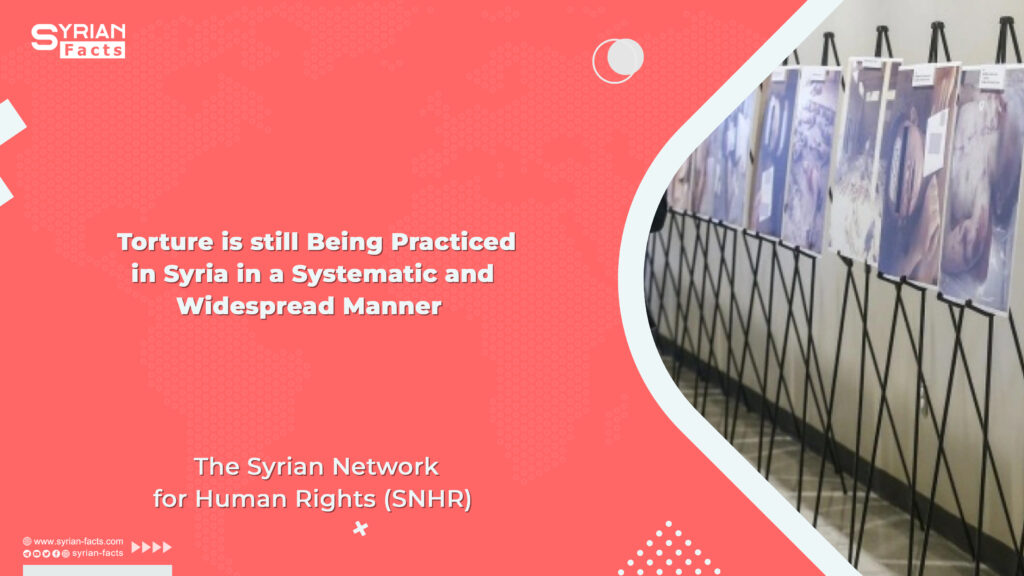On July 15, 2023, the Independent International Commission of Inquiry on the Syrian Arab Republic (COI) released a report entitled, ‘No End in Sight’ that focuses on the is- sue of torture and ill-treatment in Syria. The report, which covers the period between January 1, 2020, and April 30, 2023 sheds light on the fact that numerous patterns of torture, and cruel, inhumane, and degrading treatment continue to be perpetrated in a systematic and widespread manner in the Syrian Arab Republic, including enforced disappearance practices, in detention facilities. The report reiterates that arbitrary arrest and ill-treatment continue to be major issues that threaten the lives of individ- uals living in the areas under the Syrian regime’s control, including those areas over which which the regime regained control in recent years, as well as threatening the lives of Syrian citizens returning to the country. The report underlines this crucial fact amid mounting pressures on Syrian refugees and asylum seekers to return to Syria from their host countries.
The report focuses on the abuses in regime detention centers, as well as those per- petrated by three other non-state parties, namely Hay’at Tahrir al-Sham (HTS), the Syrian National Army (SNA), and the Syrian Democratic Forces (SDF). Moreover, the report draws upon 254 interviews conducted during the period which it covers. Of these interviews, 107 were conducted with people who endured torture themselves or were eyewitnesses to torture in regime detention centers, while 105 other inter- views concerned the detention practices of the other parties. More particularly, the report focuses on the Syrian regime’s four main agencies, namely the Air Force Intel- ligence, Military Intelligence, Political Security and General Intelligence Directorates, as well as the Criminal Security department affiliated with the regime’s police and military prisons. Each of those four intelligence agencies, the report notes, operates multiple operational centers in Damascus that serve as their central headquarters, in addition to overseeing other branches across Syria, in which hundreds of detainees are held. The report also lists the detention centers which it covers that are operated by the other parties to the conflict.
.
The report notes that detainees are held for prolonged periods without being able to contact their families, friends, or lawyers, during which time they are subjected to vari- ous forms of torture and ill-treatment, usually with the goal of terrorizing them or forc- ing them to provide ‘confessions’, or as a form of punishment. Those methods of torture include “suspension by one or two limbs for prolonged periods (shabeh) or being folded into car tyres (dulab), severe beatings all over the body including the genitals… electric shocks, burning of body parts and sexual violence” as well as detainees being held in inhu- mane conditions that involve putting them in overcrowded cells, and subjecting them to severe shortages of food and water, while providing poor or non-existent healthcare. The report also adds that the methods of torture, patterns of arbitrary arrest, and cases of enforced disappearance in the areas controlled by non-regime armed groups are similar to those practiced by the regime, but are significantly smaller in scale. In October 2019, The Syrian Network for Human Rights (SNHR) released an extensive report document- ing 72 methods of torture used by Syrian regime forces in their detention centers, and in January 2022 we released another exhaustive report tackling the HTS’s judiciary and detention centers, as well as detailing the torture methods used by the group.
Furthermore, the report stresses that torture and ill-treatment remain a significant risk for refugees and Syrians residing abroad upon their return to Syria.
The report concludes that the COI has reasonable grounds to believe that the Syrian regime’s government “has continued to commit acts of torture and cruel, inhuman and degrading treatment, rape and sexual violence, and enforced disappearances against persons in its detention facilities.” These acts, the report confirms, amount to crimes against humanity and war crimes. Additionally, the report notes that the institutions affiliated with the Syrian regime’s government have systematically failed to prevent tor- ture practices or to investigate reports of torture and custodial deaths, or enforced dis- appearances. The report also sheds light on how “the lack of death notifications – and the lack of details provided in official records and notifications when provided – indicates that they actively attempt to cover up deaths in custody. This is a continuation of a pro- cess of coordination between state institutions.” These institutions, the report further notes, are involved in torture practices and enforced disappearance whose victims “are not limited to the persons who were forcibly disappeared, but also include their families.”
.
The report calls on the Syrian regime and other parties to the conflict to immediately cease all detention practices and enforced disappearances, and to ensure that all detain- ees are able to immediately call their families and lawyers, while also promptly allowing access to independent monitors to all detention facilities. Moreover, the report calls on the regime and all other parties to immediately end all torture, other forms of ill, cruel, or degrading treatment, including sexual and gender-based violence, and execution of de- tainees, and to issue clear directives through all relevant intelligence, military and police commands to that effect, and make such directives public.
The report also emphasizes that it must be ensured that the perpetrators of all such vi- olations are held to account in fair trials, and that UN member states must continue to seek accountability.
We, at SNHR, welcome the findings and recommendations of this report by the COI. SNHR has supported the COI’s mandate and investigations since it was founded in the summer of 2011. The COI has done a lot for the Syrian people, including those victimized by the regime and other parties, and has documented the violations committed against the country’s people with impartiality and integrity, while also considering and taking to heart some of the criticism leveled at its work. SNHR has worked with the COI’s investiga- tors since its very first days by making available the data, information, and relationships we have built with the victims and their families, including the information contained in this report. SNHR will continue to support the COI’s work based on our belief in the vital importance of its mandate as gross violations are still being committed in Syria, especial- ly and particularly at the hands of the Syrian regime.





Be the first to write a comment.